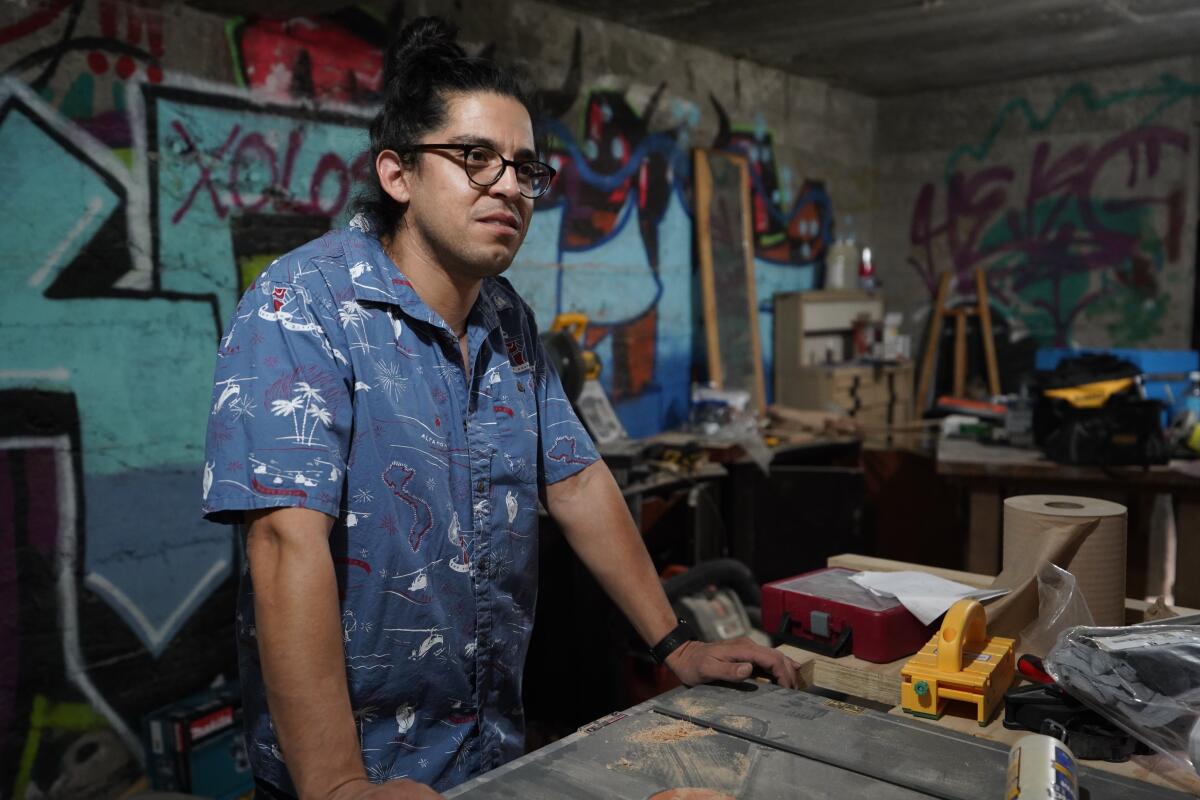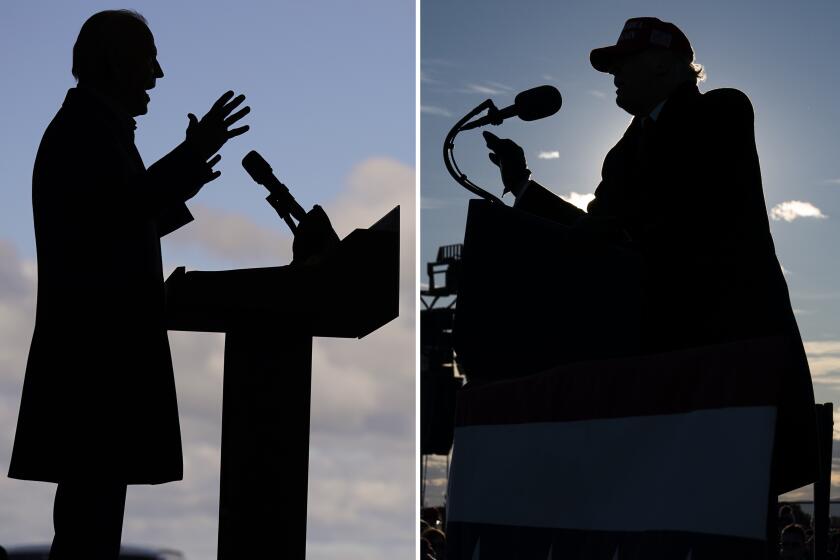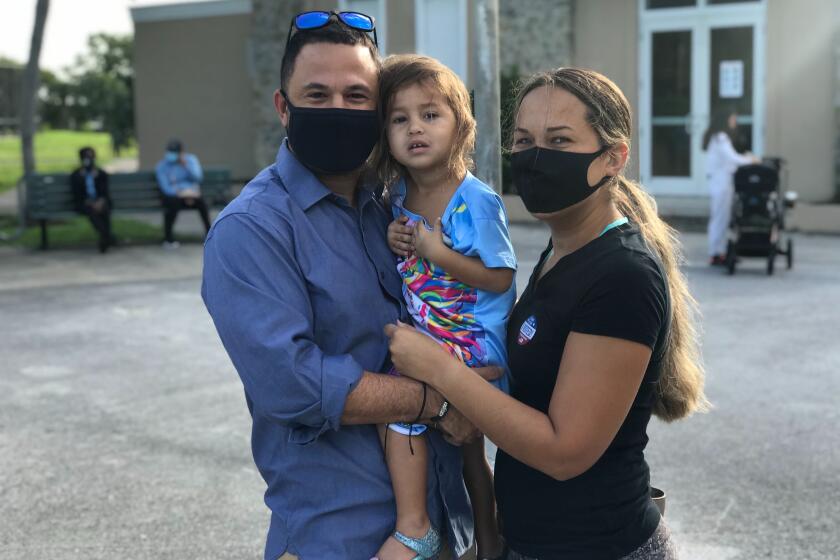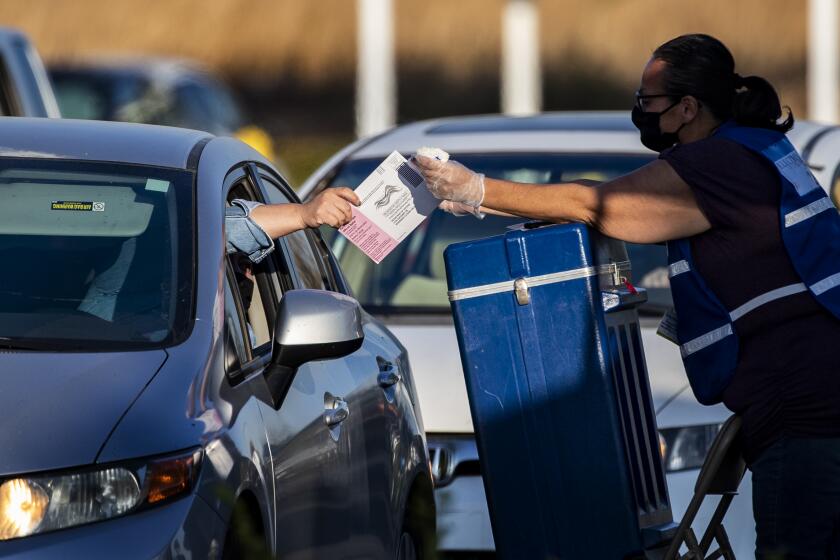Braving coronavirus and long waits, U.S. citizens cross the Mexican border to vote

- Share via
TIJUANA — Hundreds — possibly even thousands — of Tijuana residents who are also U.S. citizens have already voted or plan to cross into the United States to cast their ballots in the presidential election.
Voters coming from Baja may face longer border waits than in normal years and be required to wear a mask, but county election officials say they are welcome.
“As long as someone is a U.S. citizen, they have a right to vote,” said Michael Vu, the San Diego County registrar of voters. Vu estimated there were nearly 16,000 voters registered to cast ballots in San Diego County from abroad, including members of the military stationed overseas.
Voters from Baja California range from liberal young professionals living in the urban centers of the city to retirees to former U.S. law enforcement officials living on the beach south of Rosarito, who tend to be conservative.
They are all part of the intertwined cross-border community, whose lives have been complicated by the coronavirus pandemic and swept up in Trump administration efforts to limit immigration. Political participation works the other way too: Mexicans living in California and other U.S. states regularly come back home to vote in Mexico’s elections.
Tuesday marks the end of a tumultuous Trump and Biden race. It’s unclear when the results will be known.
Tijuana resident Mario Rodriguez is planning to vote in the U.S. presidential election on Tuesday. The 34-year-old architect was born in San Diego and graduated from the NewSchool of Architecture and Design in San Diego.
“There’s too much on the line not to vote,” said Rodriguez, a dual citizen of the United States and Mexico, who fluently speaks English and Spanish with a distinctly Southern California, coastal-urban accent. “This time is a major turning point.”
Rodriguez says he lives the type of cross-border lifestyle that leaders in Washington have a hard time understanding “even though they are a major influence on our local politics here in the Cali-Baja region.”
He runs an Airbnb business in Tijuana, staying at his family home there at least half the time. The issues that are most important to him are the environment, cross-border traffic and social issues, such as LGBT rights.
“U.S. elections don’t just impact the United States,” he said Thursday, during an interview in the basement of his Tijuana home, where he does woodworking. He places the furniture, countertops and decorative pieces he makes in his Airbnb properties, giving them a beachy, Mexican-surfer vibe.
Rodriguez gave as an example a U.S. federal enforcement action at the border in August that caused an approximately eight-hour traffic jam, during which a woman died of what appeared to be a heart attack, according to Tijuana authorities.
“That was really harsh,” he said. “Thankfully, things have been a lot cooler since then.”
Rodriguez also said President Trump put Tijuana on the map in a way he didn’t appreciate, repeatedly claiming it was the “the most heavily infected place anywhere in the world.”
“The way Tijuana was being spoken of on national TV and in politics ... it was just weird how they would describe the situation. I kept thinking it looks a lot different from where I’m standing,” Rodriguez said.
Election 2020: Our reporters, dispatched to more than a dozen cities in battleground states, are asking voters what brought them out to the polls.
In La Salina Del Mar, a beach community of mostly retirees, some residents previously worked in law enforcement or the military in the U.S. and tend to vote Republican.
The restaurant La Salina Catina Beach proudly features the “Taco Bowl” as a favored entrée, a nod to Trump’s “Cinco de Mayo” tweet in 2016, which sparked widespread criticism about pandering and outrage among some Latinos living in the U.S. A taco bowl is not a traditional Mexican or Latin American dish.
Janene Caracaus, 62, who spends four nights a week in Los Alisitos, north of Ensenada, planned to go to Spring Valley on Saturday to cast her vote for Trump.
For Caracaus, who works full time as a nurse in San Diego, the main issue is how the different leaders plan to approach the coronavirus pandemic. Border policy is also a factor.
“I think we’ve got to keep the economy open, and we have to try to keep the cases low ... and once you open up again, you’re going to see some spikes, but there’s some evidence coming out that this virus is getting a lot less deadly than it originally was,” said Caracaus, who also works in the medical community in Baja California.
“I think the man is trying his best,” Caracaus said of Trump. “A lot of people down in Mexico think Biden is going to control the virus, and you can’t control a virus. What would Biden have done differently? Other than maybe shutting the country down more, and I don’t think that’s the answer.”
Caracaus organizes the “President Trump Supporters of San Diego” and “Trump Singles of San Diego” groups on Meet-Up that meet together once a week north of the border.
“Being locked-up all the time, I don’t think that’s good for the kids, for the economy or really for anyone. It’s not healthy to spend 24 hours a day closed up in your home, alone,” she said.
An estimated 1.5 million Americans live in Mexico. The U.S. government doesn’t track exactly how many U.S. citizens specifically live in Baja California, nor how many are registered to vote in San Diego County. Many people maintain residences on both sides of the border.
Vu said the types of people voting from abroad typically fall into one of three categories: expats who live abroad and typically vote by mail-in ballot; military serving overseas; and residents who spend some of their time in Mexico and some of their time in San Diego.
While the long wait for election results is unfamiliar in other parts of the country, it’s common practice in the Golden State.
But voters groups and campaign insiders say there could be as many as 75,000 eligible voters living in Baja California. The reason for the discrepancy in numbers is that people are required to register to vote only with their permanent home address in San Diego and not disclose whether they have a secondary property or if they live most of the time in Baja California.
Baja Californian participation in U.S. elections has sometimes raised questions about fundraising and political spending south of the border. Political campaigners have to be careful about what they do when their activities stretch into Tijuana.
While it’s not illegal to have political advertising for a U.S. campaign in Mexico, it could be a violation of campaign laws if a U.S. citizen doesn’t properly disclose the spending.
Merci Esposito, 64, maintains an apartment she shares with her daughter and granddaughter in Oceanside, but said she mainly lives in Rosarito. She said not being able to afford to live in San Diego was a major motivation for her to vote.
“I can’t afford to live on Social Security in San Diego,” she said. “Voting was critical for my daughter, granddaughter and me.
“We were apathetic voters in 2016; only I voted. ... My grandbaby was not old enough, and my daughter disliked Hillary and hated Trump so she denied both her vote.”
This year is different, she said.
“After four years of watching, living and suffering due to Trump and his administration ... it became painfully clear we three women, descendants from a strong and educated Italian family, talked about not canceling each other’s votes,” Esposito said. The family held a video call to discuss candidates and propositions “ad nauseam,” until they all reached agreements, she said.
“It was awesome. We debated back and forth for hours one morning, and we each completed our ballots and sent them in by mail,” Esposito said.
Fry writes for the San Diego Union-Tribune.
More to Read
Sign up for Essential California
The most important California stories and recommendations in your inbox every morning.
You may occasionally receive promotional content from the Los Angeles Times.














